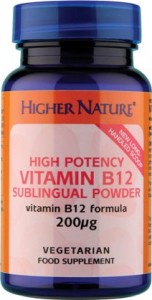Vitamins. We’re constantly bombarded in the media and on the Internet by calls to boost our vitamin levels, aren’t we? Let’s be honest, only a fool wouldn’t take heed of them and not recognise the importance of all those A-Z multivitamins’ importance in seeing our bodies work as they should. But while many people are good at making sure they get enough of the likes of Vitamins A, C and D, one nutrient in particular they may not pay as much attention to – and, thus, not get enough of – is Vitamin B12.
In fact, in just the United States alone, it’s estimated that nearly one in four people suffer from Vitamin B12 deficiency1. What are they missing out on then? What are they putting themselves at risk from? And what can taking more B12 do for them? Well, don’t doubt it, this is one vitamin that plays an enormous role in ensuring our bodies function as they should – it’s involved in a whole host of different good things that go on in our bodies. Here’s just a taster…
Heart protection
Surely nobody needs convincing of the importance to your body of a healthy heart. In which case, you shouldn’t take lightly the fact B12 plays a prominent role in maintaining the health of your heart and whole cardiovascular system. One of the reasons for this is that the vitamin’s excellent at removing from your blood a threatening protein named homocysteine which, left alone, can damage your arteries resulting in inflammation and, potentially, heart disease.
Nerve damage prevention
Should your nerves become so damaged they die, thus signals to and from the brain become disrupted, you could develop a nerve-related condition which would likely seriously affect your health. The answer? Preserving the protective covering of your nerves – otherwise known as myelin sheaths – which ensures they’re not harmed by free radicals and toxins in your blood. Don’t doubt it; B12 is massively important in maintaining the health of your nerves’ myelin sheaths.
Bone strengthening
It’s also believed that consuming B12 may be good news for preserving or building up the strength of your bones. Research has suggested that those who suffer from osteoporosis – the bone-debilitating condition – may well have higher levels of homocysteine and lower levels of B12 in their bodies than those with healthy bones2.
Energy release
Taking time to rest and maintain a good diet are, of course, highly advised in order to remain well and full of beans, but making sure you’re not deficient in certain vitamins is also well known to be important. And one of these vitamins is, yes, B12. It’s one of the nutrients that, once consumed, actively releases energy into your body’s cells, ensuring they don’t go hungry and make you feel tired and weak.
Good for positive mood
Mental health is, of course, as important as physical health. And here lies another of the benefits of Vitamin B12. If you’re experiencing ‘the blues’ and feeling down, again it could well be you’re not getting enough B12; its existence in the brain can help provide a chemical called serotonin, which plays a critical role in regulating your mood. Indeed, a study of diabetic patients who’ve experienced a side effect of depression from the treatment drug Metformin revealed that those who took B12 to combat this reported a more positive outlook3.
Enhances physical health of the brain
In addition to being good news for your mental health, B12’s also important for maintaining your brain’s physical health – because it protects nerve cells. Indeed, Alzheimer’s sufferers, contrasted with those of a certain age whose memories are still sharp, tend to have lower levels of B12. The vitamin then, it’s believed, is important in protecting brain cells’ myelin sheaths, which Alzeheimer’s patients often lack. Research has also suggested that via targeted nutritional intervention (including upping B12 levels), cobalamin deficiency – which may play a role in the onset of dementia – could well be reversed4.
How to boost your B12 intake
So, no question then, B12 is one very crucial vitamin. If you feel you may be deficient in it and could benefit from upping your levels of intake, you’ll be pleased to discover it’s readily available via The Finchley Clinic as a supplement. Through us, you can purchase Vitamin B12 in:
- tablet form – Vitamin B12 – 500mcg; Sublingual Vitamin B12 1,000mcg with Folic acid and Sublingual Vitamin B12 1,000mcg with Folic acid and B6
- liquid form – Nutrisorb MethylFolguard; Vegansafe B12 and Vitasorb B12
- powder form – Sublingual Vitamin B12 powder
- as a spray – B12 Spray – from Methylcobalamin and Bx3 Spray The Healthy Heart Formula – formerly Homocysteine Control Spray.
So whichever way is easiest and best for you, we can help you get the Vitamin B12 you need.
References:
1 McBride, J. (2016). B12 Deficiency May Be More Widespread Than Thought. usdagov. Retrieved 27 May, 2016, from http://www.ars.usda.gov/is/pr/2000/000802.htm
2 Ebesunun M. O., Umahoin K. O., Alonge T. O., Adebusoye L. A.. Plasma homocysteine, B vitamins and bone mineral density in osteoporosis: a possible risk for bone fracture. Afr J Med Med Sci. 2014 Mar; 43 (1): 41-7.
3 Biemans E., Hart H. E., Rutten G. E., Cuellar Renteria V. G., Kooijman-Buiting A. M., Beulens JW. Cobalamin status and its relation with depression, cognition and neuropathy in patients with type 2 diabetes mellitus using metformin. Acta Diabetol. 2014 Oct 15.
4 Osimani A., Berger A., Friedman J., Porat-Katz B. S., Abarbanel J. M. Neuropsychology of vitamin B12 deficiency in elderly demential patients and control subjects. J Geriatr Psychiatry Neurol. 2005 Mar; 18 (1): 33-8.

